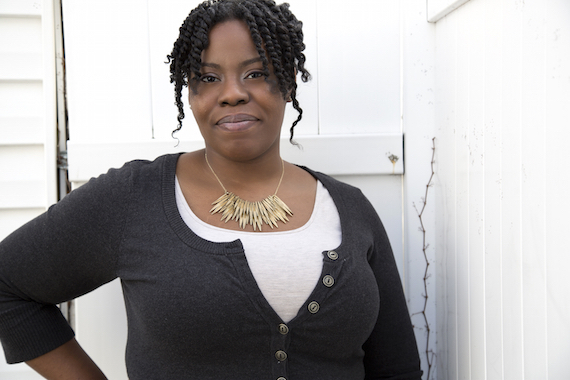
Melissa Williams, photo courtesy of Julie Hassett-Sutton/Frantic Studio via Global Kids
Neither of my parents got to go to school in a traditional sense. They were working, supporting their families. My mom finished school while she was pregnant. Just seeing how hard my mom worked, and how important education was to my family, has always been ingrained in me. Education is your key to lifting yourself up. I always loved school, even when I was little. I loved getting books for Christmas. I had a passion for learning and knowing how things work.
In high school, my math class was so overcrowded that if you didn't get there in the first ten minutes, you would spend most of the period trying to find an extra seat. And the teachers didn't expect much from the students.
I knew kids in well-to-do areas were being challenged. I knew we should be learning more. A lot of the kids made you feel bad for wanting to do better, for raising your hand and asking, "Can you challenge us more?" I used to think, "This is a difficult situation, how do I see the light?" Global Kids provided that light.
At my school, Global Kids had a program that was specifically for women, and that was special. It was a safe space for young women to come together and talk about issues that you don't necessarily get to talk about in the classroom. Global Kids showed you there was someone who thought, "You guys do matter. You're not just some throwaway kids in this inner-city school. You can effect change."
When I went to the citywide program at Global Kids' office, we talked about child labor laws and how Nike's overseas factories employed children and underpaid all of its workers. I think I didn't wear Nikes for many, many years after I learned that it costs less than $5 to make a pair of shoes. They were marking them up to $100, $200 and selling them to people here, while the factory workers couldn't support their families. This showed me how my role as a consumer, even with my little allowance, could either contribute to that problem or help to alleviate it. That was empowering.
You think that these issues don't have any bearing on you. You'd see things on the news and it wouldn't relate to you. It might even be something like, "I live in Brooklyn. What's going on in Manhattan doesn't relate to me." Global Kids helped to connect those dots.
One thing I liked about Global Kids was that it was okay to change your mind. You could feel, "I learned something new. I learned someone else's position, and maybe I wasn't right about something I had believed for so long. Maybe this is a new way to think about it."
They don't force their own agenda. They want you to become a thinker, to become more enlightened on your own terms. They say, "Here's the information, here's the other side, here's what the media presented, here's the full back story and you come to your own conclusions."
I ended up going to Cornell. My experience in Global Kids helped prepare me for difficult conversations I had at college. I went to school with many students who had gone to prep schools and automatically assumed that I only got in because of affirmative action or a track scholarship. People would ask me if I was on the track team and I would say, "No, I got here on a merit scholarship. I was accepted to the Cornell Presidential Research Scholars Program."
My training helped me not to become angry and just write people off. It helped me to say, "Let me ask you a question to see why you're thinking that, and then help you arrive at a different conclusion." Global Kids helped me to have conversations with folks.
I think a lot of people are scared to move out of their own little pockets of people who look and feel like they do, which means you miss a lot of opportunities for growth, personally, professionally, and spiritually.
I had wanted to be a doctor since the second grade, but at Cornell, I majored in Human Biology, Health, and Society. I was able to look at things from many different perspectives to see what influenced health. I didn't want to work on the individual level. I wanted to do something that impacts communities, cities, and countries. When you have sick people in a community, you have to think about the structural issues coming into play. This is how I ended up at Johns Hopkins getting my Masters degree in Health Policy and Management, with a minor in Health Disparities. It's helped me tailor different solutions for different communities. I want everyone to come to a complete place of health.
I've met some current Global Kids students-- they are well-spoken and well-versed about many issues. They can move in a crowd of diplomats and hold their own. It's so important, especially if you want to have people who look like me on the national stage.
-- Melissa Williams